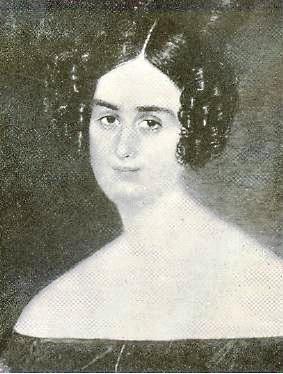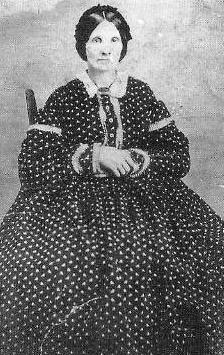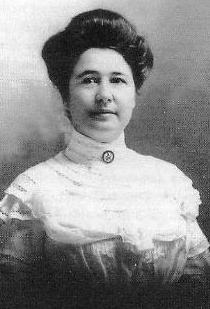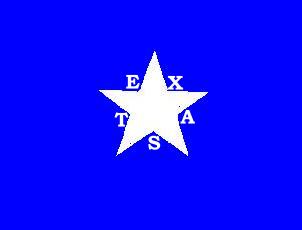SONS OF DEWITT COLONY TEXAS For additional biography, search Handbook of Texas Online
"He presents one of the most spotless and exalted characters of modern times and his memory should be cherished by the children of' Texas as one of the purest patriots of this or any other age."---John Henry Brown
Manuel Lorenzo Justiniano de Zavala y Sáenz 1788-1836 General Lawrence De Zavala One of the Makers of Texas, Honored in London, Paris, Madrid, and America, for Whom the De Zavala Chapter [of the Daughters of the Republic of Texas] was named. (This sketch was read at De Zavala School, San Antonio, Texas, November, 1915, in connection with the ceremonies incident to the presentation of the portrait of De Zavala, a gift of Mrs. W. W McAllister. The program was in charge of the Parent Teachers Club, Mrs. H. A. Moos, President) [This portrait is the most common portrayal of Zavala in various history records, presumably the one presented and now in the Archives Division, Texas State Library--WLM]
Left: Emily de Zavala, portrait probably made in Paris 1834
The keynote of the life of Lawrence (Lorenzo) De Zavala was love of his fellow men. He was ardently patriotic and possessed an insatiable desire for increased knowledge. Duty was his watchword. These three heart's desires ruled his life and he stands forth in the history of Texas as the philanthropist and the scholar. Mirabeau. B. Lamar in his inaugural address, "all unconscious that the great patriot was even then nearing the valley of the shadow of death," refers to his friend, De Zavala, in these graceful and comprehensive words:
A gentleman, a patriot, a scholar and one who loves his fellowmen. What a fine ideal for the youth of any land; and for the youth of Texas; and for the pupils of this particular school which bears his name. You have a right to be proud of your school for the excellent work it has done and is doing and of the name it bears. No name emblazoned on history's pages is superior. You need yield to none in rank of namesake. Each great Texan achieved in his own line, and De Zavala's field of achievement was the alleviation of suffering, the uplift and awakening of his fellow men, in educating them and otherwise serving and ministering to them. He started and put in successful operation the first system of free primary schools, if not in the United States and America, at least the first in America this side of the Alleghenies. He founded and edited the first political newspaper in the same territory. In personal attainment he had no equal in Texas. He read, wrote and spoke fluently English, French, German, Italian, Spanish, Portuguese, Greek, and Latin and other languages. His research work attracted world-wide attention, and among many honors accorded him he was made a member of the Geographical and Scientific Society of France, an honor of distinction even of the present day comparable with that of election, to the French Academy. At the Court of St. James, England, and the Court of St. Cloud, France, he was sought after and honored highly as well as at the Court of Madrid, and elsewhere in Europe. He was the author of the Constitution of 1824, and his name is the one signed first to that instrument as the president of the Congress adopting it. He openly advocated the separation of Texas from Mexico before many would dare to even think of it, and in a speech made at Harrisburg gave his views in so logical a manner that the legal phases were made clear to all. This speech was printed and sent broadcast over the State and did much to present the question of independence properly and calmly before the people of Texas. He was elected as a delegate to the Consultation which he had suggested and urged should be held and for which he set the date when it should be held. He was also a member of the Convention and was placed on every important. committee whose work helped to form the Republic of Texas.
De Zavala's following became so great and his popularity was such that the Mexican authorities began to fear for their leadership. At this time he left for Europe, where he enjoyed the advantages of a regular collegiate education. Thus he spent much of his early life amidst scientific associations eminently calculated to impart polish and refinement to his manners and give expansion and vigor to his understanding. Before returning to America he traveled over Europe, and studied customs and conditions. The efforts that he made at Madrid, Paris, London and elsewhere for the recognition of the independence of Mexico gained for him fame as an eminent statesman. He was one of the most zealous friends of that whole train of measures, the adoption of which led ultimately to the severance of the Spanish colonies in America from the mother country. By the boldness and freedom of his declaration on this subject, while a delegate to the Spanish Cortez in 1820, and during the subsequent year he was one of the greatest factors in obtaining the freedom so ardently longed for. Returning from Europe, he was everywhere hailed as a hero. He arrived at New Orleans on the 20th of December, 1827, and spent several months there. De Zavala was chosen a deputy to the first Congress, and the National Tribune those days reverberated with his eloquence. He took up the debate as a champion of popular rights, maintaining the thesis that fees were taxes, and that taxes should not be levied upon the people except by the consent of their representatives. In 1833 De Zavala was elected for the sixth time as National Representative, his triumphs at this period of his parliamentary labors are found published in the newspapers of that time. Now a man of mature and of large and profound experience, he spoke without hate and bitterness he pitied the frenzy of his party friends, he depised the attacks of enemies, and showed that superiority and grandeur of soul which years alone, with a consciousness of good deeds and talents cultivated in the school of the world could give. The envious appeared miserable pigmies by his side, weakly opposing what irritated them. He desired progress, light, and all the social improvements to which a nation had a right to aspire, and to this all his plans and inclinations tended. The "Old Alcalde," Governor Oran M. Roberts, often referred to him as the most farsighted and greatest constructive statesman of his age, and as the one figure in Texas history over whom a halo is cast, in that it can not be even suspected that one thought of self entered into his life long work for the uplift of his fellowmen. Among the many incidents of his life, showing self-forgetfulness, is one which does him much honor. He was in Mexico, when a frightful epidemic of cholera occurred the very thought of which caused all to shudder. De Zavala, among his other accomplishments, had studied medicine, taken his degree and practiced for several years. He immediately devoted himself personally to assist the suffering, aiding the poor and weak with his purse and knowledge of medicine. He gave his help to all who called for him, whether high or low, without price, giving his special service in the lazaretto, which he ordered established for those attacked by the plague. In those days of fear and consternation De Zavala forgot self and the Civil War and thought only of succoring the afflicted. In memory of this a monument and street bears his name. On another occasion, when Governor in Mexico, a deputation of Indians appealed to him for succor and justice. They had appealed to their immediate authorities time and again without success. When they called upon De Zavala he received them kindly and heard their complaint. Upon investigation he found they had cause for grievance. Their village was situated at the foot of the Mountain of Toluca, where for ages the inhabitants of the village had received their supply of fresh water from a lake on the top of this mountain. Some wealthy owner or syndicate had diverted the course of the stream and deprived the Indians of water. De Zavala, taking a number of workmen, with axes and other implements, accompanied by his escort, climbed the mountain, winding round and round its steep sides, until the summit was reached. Here in this beautiful and. picturesque spot, he found where the water had been diverted by sluices. These he ordered cut and the pure sparkling water went bounding down its old way to the Indian village at the foot of the Sierra de Toluca. Mrs. De Zavala, who was on her first visit to Mexico, accompanied him part of the way on this ride. As they came down they were very much surprised to find a large number of the inhabitants of the Indian village in the valley, intercepting their path, bearing garlands and baskets of flowers, which they strewed in the pathway before Governor and Mrs. De Zavala twining their horses with the garlands and decorating the trees along the path they were to follow. The thanks and appreciation of these poor villagers was touching, and it was indeed a beautiful and poetic sight. Of De Zavala as an author, Henry Stuart Foote, the historian says:
On another trip to Europe, about 1830, he again visited all the countries of Europe, spending much time in each, England, Scotland, Holland, Belgium, Germany Switzerland and Italy, making his headquarters at Paris. His "Journey Through Switzerland," written at this time is highly spoken of. Of his " Travels in the United States," a well known critic and historian says:
The historian, Foote, says:
It concludes:
His colleagues in the first Congress of the Republic of Texas, over whom he presided as the vice president of Texas, were constantly addressing him by one title or another to which he was properly entitled, but as a Democrat he opposed all distinctions and titles and it was distinctly distasteful to him to be addressed by a title. It is of record in the proceedings of the first Congress, that he addressed them on the subject and asked them to address him as plain Mr., saying that he did not wish any one to feel that he was above or beyond them for an accident of birth or a title that to be an honest man and a citizen of a free republic, able and willing to serve his family, friends and fellowmen, ought to be privilege enough for any man. That titles were man-given, but that an honest man was the.noblest work of God. He was also an empresario, bringing out and colonizing at his own expense a number of families in De Zavala's Colony extending from the Sabine River on the east to the Trinity on the west and the Gulf of Mexico on the south and a line through Nacogdoches on the north. His present resources were always subject to the call of unfortunate friends, and there are many descendants of those friends whom he has tided over rough places still living in San Antonio. He was too noble to be suspicious, too brave to be envious, too magnanimous to be jealous. His name is indelibly stamped on the pages of Texas history as the gentleman and the patriot, but pre-eminently the philanthropist and the scholar. It is perpetuated in the name of one of the counties of Texas, in the name of streets, schools, companies---a town in East Texas within the borders of his empresario grant, is named for him. His name is inscribed on the $50,000 monument at Galveston, given by Henry Rosenberg; a battleship was named for him by the Republic of Texas. An oil painting by a celebrated artist was purchased by the State of Texas and ordered hung in the State chamber at the right of the speaker's desk, where it may be seen. Mexico and Yucatan has honored him for his philanthropic work and work done as a Statesman in the National Congress. The name of Yucatan was changed to Yucatan De Zavala, and streets have been named and monuments erected in his honor. London, Madrid and Paris honored him. One writer thus sums up his life, "A man of talents, of rare virtues, scholarly and gentlemanly accomplishments, forbearing, patient and constant, prudent in private life and to crown all that he was in every sense of the word an honest man whose word was as good as his bond. Of all the signers of the Declaration he risked most. He was the wealthiest man in the colonies at the beginning of the revolution. He knew no day of rest from the moment, when in his youth he consented his efforts to humanity, to the close of the eventful year of 1836, when in the midst of unremitting labor for the new republic he had helped to found, his great soul passed to the eternal life. Having passed through the dark and stormy times of the revolution, in which he took an active part and which he was largely instrumental in bringing to a successful issue, he was now fast approaching his end. His long imprisonment in the damp dungeon of San Juan de Ulloa; his harassing duties in aiding to organize the government and framing the laws of a new nation, and other duties resting upon him, gave him no time to attend to his health or even think of it. The immediate cause of his death was the overturning of a canoe in which he was crossing Buffalo Bayou with his small son, Augustine De Zavala. He rescued the boy, placing him upon the overturned canoe, and swam with him to the shore. He contracted a severe cold, which developed into pneumonia from which he died November 15, 1836. On learning of his death Congress passed suitable resolutions of regret and adjourned on motion of Mr. Ellis as a further manifestation of the respect that body had for their late vice president. They further named a committee of three to consider and report to the Senate the most suitable manner for Congress to manifest its respect for his memory. The Telegraph and Texas Register of November 26, 1836, contains this obituary:
All Texas mourned his loss, and in particular San Antonio. To friends in the Alamo and the town of Bexar he had set a special courier to warn them of the coming of Santa Anna. Brown concludes the story of De Zavala in these words:
Reprinted from History of the Legends of The Alamo and Other Missions in and around San Antonio by Adina De Zavala, 1917 SONS OF DEWITT
COLONY TEXAS |
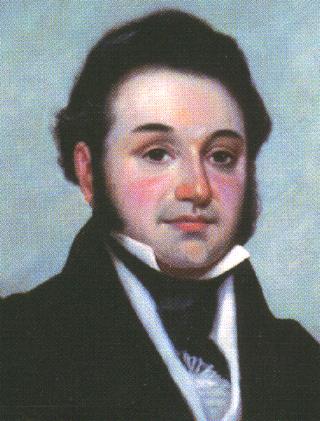 In personal attainment he had no equal in Texas. He read,
wrote and spoke fluently English, French, German, Italian, Spanish, Portuguese, Greek, and
Latin and other languages. His research work attracted world-wide attention...he was made
a member of the Geographical and Scientific Society of France. At the Court of St. James,
England, and the Court of St. Cloud, France, he was sought after and honored highly as
well as at the Court of Madrid, and elsewhere in Europe. He was the author of the
In personal attainment he had no equal in Texas. He read,
wrote and spoke fluently English, French, German, Italian, Spanish, Portuguese, Greek, and
Latin and other languages. His research work attracted world-wide attention...he was made
a member of the Geographical and Scientific Society of France. At the Court of St. James,
England, and the Court of St. Cloud, France, he was sought after and honored highly as
well as at the Court of Madrid, and elsewhere in Europe. He was the author of the 